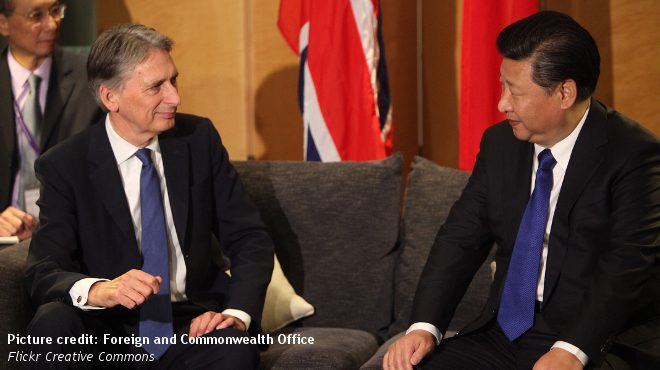Why Brexit won’t bring China and Britain together

A key promise in the Brexit bandwagon was that after Brexit, Britain could negotiate trade deals with whomever they liked. After all, Britain hasn’t negotiated an independent trade treaty since 1973. Seemingly, Britain could offset the negative implications of leaving the single market by crafting new trade deals with partners like China.
There is some merit to this idea, as Peter Lilley MP the former Secretary of State for Trade and Industry has pointed out, “outside the EU we will be able to negotiate speedily the really worthwhile deals to access fast growing protected markets such as China, India and Brazil which the EU has ignored.”
Lilley is right to an extent, while in the EU, Britain cannot negotiate its own trade deals. However, negotiating such a deal at this time is strategically unsound and should not be a priority for Britain.
No New Deals
For one, it is illegal for the UK to begin to negotiate deals until after March 29, 2019. In spite of this, Theresa May, Chancellor Philip Hammond and UK Trade Secretary Liam Fox have each undertaken trade tours to initiate trade deals post-Brexit with Foreign Office Minister Mark Field visiting Beijing on a similar mission.
Whilst these tours play well to the idea that Britain is making strides towards a fruitful post-Brexit future, as some analysts have already pointed out, negotiating a trade deal with the EU should be a much stronger priority than a trade deal with China.
At present, 44% of Britain’s exports go to European countries while only 3.6% go to China. Whilst this does not mean that China-UK trade will not grow further, there is evidence to say the opposite, rather, a trade relation with China is not a cure-all. Negotiating a favourable deal with the EU should be the chief priority for Britain.
Moreover, Britain still needs approval from at least 20 EU members in order to secure their exit deal. Motioning towards prospective trade deals prior to leaving the EU is a poor strategy that will likely result in little goodwill from the EU at a time when they need affable relations.
The WTO Option
If Britain does not reach an agreement with the EU, a trade deal with China is still a low priority. In the event this happens, a preference favoured by the Brexiteers is the “WTO option”. Britain becomes an independent WTO member and trades under WTO rules. This may sound simple, but like anything related to Brexit it is mired in complexity.
As an independent WTO member Britain needs to have its own ‘schedules’, those are lists of taxes and quotas that it can apply to other countries’ products. It could use the present set of schedules set out by the EU, but being dictated to by Brussels is not in the spirit of Brexit.
Therefore, it is likely that Britain would have to negotiate new schedules which would need to be approved by the other 163 WTO members who each wield veto power. Consequently, if Britain pursues the WTO option, it needs the EU on its side. Again, the priority should be placed with Britain’s relationship with the EU, not a trade agreement with China.
Brexit-lite
Another option on the table has been dubbed ‘Brexit-lite’. Under this arrangement, after March 29, Britain joins into a customs union for at least the interim.
A key reason being that it will delay the issue of the creation of a physical border between the Republic of Ireland and Northern Ireland. However, as part of a customs union Britain will not be able to cut deals with third-countries like China.
China’s Perspective
Even if we ignore these scenarios, is a trade deal with Britain a priority for China?
The short answer is no.
After Brexit, China will lose London as its backdoor to the single market resulting in a drop of 435 million consumers. Making Britain even less appealing are the figures released during the opening months of 2017 that showed Britain’s economy had the slowest GDP growth in the EU.
The answer is clearer if we look at what Beijing wants.
China is seeking market economy status from the EU and Britain had supported this ambition. Whilst in the EU, Britain was reportedly, “the only country that expressed unconditional support for China”. Outside the EU, Britain can no longer uphold China’s interests in Brussels.
But aside from trade, Brexit strategically disadvantages China. One can expect that as Britain moves away from Europe it is likely to move closer to Washington and strengthen the ‘special relationship’ shared between the US and the UK. It is telling that both President Xi Jinping and Premier Li Keqiang showed public support for Britain to remain in the EU.
Although Brexit was a somewhat unexpected reality there are some assurances that the ‘golden era’ of relations between China and Britain as predicted by Philip Hammond will happen no time soon.
Brexit will not be a force to drive China and Britain closer together.